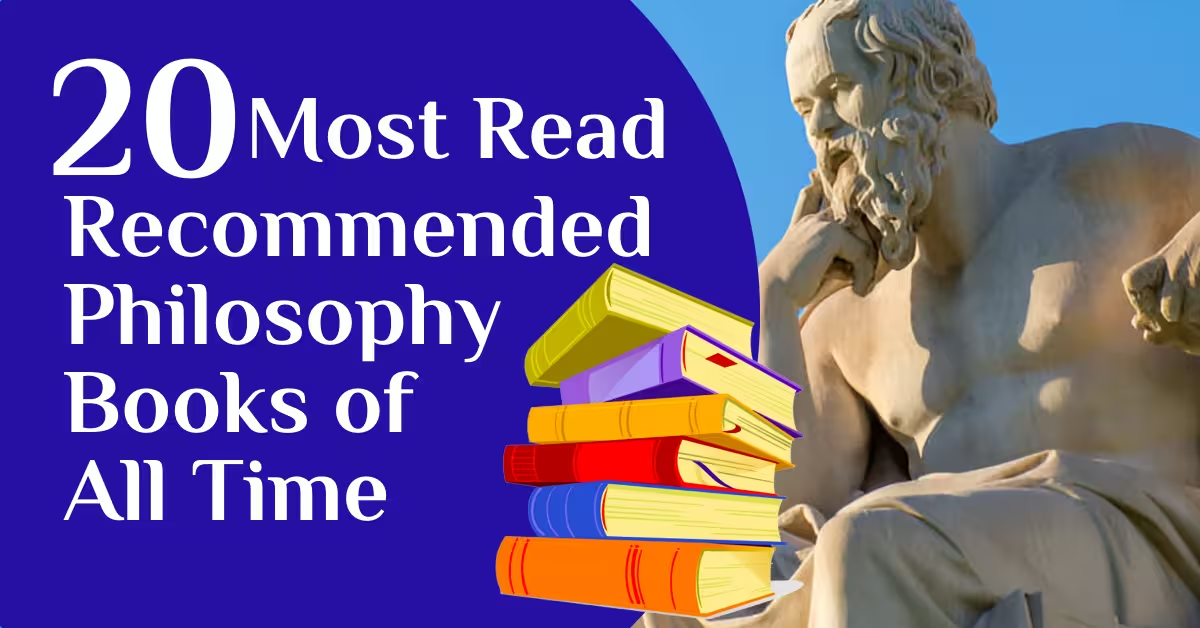Last updated on September 15th, 2025 at 05:54 pm
Whenever I think about the Top 20 Philosophy Books, a deep sense of awe and gratitude fills me. These books aren’t just relics of the past — they are living, breathing conversations between brilliant minds across centuries. Whether someone seeks the Most Read Philosophy Books for personal growth, the Most Searched Philosophy Books to understand human nature, or the Most Recommended Philosophy Books of All Time for scholarly work, these twenty works offer something truly timeless.
Through my own journey, I found that these books helped me navigate some of life’s most pressing questions: What is justice? What is happiness? What does it mean to live a good life? Each of these masterpieces provides a different answer — and it’s in grappling with them that I found some of the most meaningful experiences of my life.
In this article, I’ll walk you through each of these Top 20 Philosophy Books. I’ll not only summarize them but also share my personal encounters with their core arguments and passages that stayed with me long after I closed their covers.
Table of Contents
20 Best Philosophy Books
1. The Republic by Plato
When I first read Plato’s The Republic, I felt like I was being invited into an eternal debate about justice, society, and the soul itself. This book stands tall among the Most Read Philosophy Books, and for good reason.
At its heart, The Republic tackles the question: What is justice? Socrates, speaking through Plato, engages in a series of dialogues with different Athenians, exploring justice not just in the individual, but in the city-state. The famous allegory of the cave, from Book VII, struck me the most — the imagery of prisoners mistaking shadows for reality was a metaphor that resonated deeply with me. Plato writes:
“The prisoners would mistake the shadows for reality… they would see only their own shadows, or the shadows of one another.” (Book VII, 514a)
This passage made me question: how much of what I accept as “reality” is simply a shadow of deeper truths I’m yet to perceive?
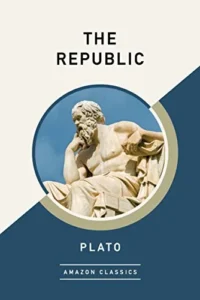
Another profound theme in The Republic is the idea of the philosopher-king — the notion that only those who have grasped the eternal Forms (especially the Form of the Good) are fit to rule. Plato’s call for wisdom and virtue over ambition and greed in leadership felt especially relevant today, living in a world often dominated by the latter.
One of the reasons The Republic remains among the Top 20 Philosophy Books is because it challenges the reader to think beyond politics and sociology — it’s about the internal governance of the soul itself. Plato suggests that a just individual is like a well-ordered city: each part (reason, spirit, appetite) fulfilling its role in harmony.
By the end of my first reading, I realized Plato was not handing us answers but urging us to keep questioning — to ascend out of the cave of ignorance into the light of true knowledge. No wonder it is also among the Most Recommended Philosophy Books of All Time.
2. Nicomachean Ethics by Aristotle
When I picked up Aristotle’s Nicomachean Ethics for the first time, I wasn’t prepared for how intimate the experience would feel. Unlike Plato’s grand dialogues, Aristotle writes with a directness that almost feels like advice from a wise mentor — it’s no wonder it’s considered one of the Top 20 Philosophy Books ever written.
At its core, Nicomachean Ethics explores the essential question: What is the good life for a human being? Aristotle’s answer centers on eudaimonia — often translated as “happiness” or “flourishing.” But as I read deeper, I realized it wasn’t the fleeting happiness we often chase today. Rather, Aristotle described it as:
“Activity of the soul in accordance with virtue in a complete life.” (Book I, 1098a16-17)
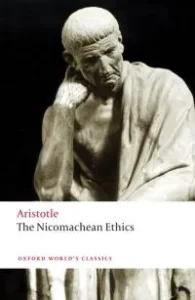
That one line changed the way I thought about happiness. It wasn’t about feeling good, but about living virtuously and fulfilling one’s purpose.
One of the most powerful insights from the book was Aristotle’s concept of the “Golden Mean” — the idea that virtue lies between two extremes. For example, courage lies between recklessness and cowardice. Reading that, I started noticing moments in my own life where I had been too rash or too fearful, realizing that Aristotle’s wisdom was not abstract philosophy — it was practical guidance for daily living.
Another passage that left a deep mark on me was Aristotle’s reflection on friendship:
“Without friends, no one would choose to live, though he had all other goods.” (Book VIII, 1155a5)
In a world obsessed with material success, this reminder about the irreplaceable value of human connection felt revolutionary.
Because of its timeless relevance, Nicomachean Ethics continues to rank among the Most Read Philosophy Books, the Most Searched Philosophy Books, and the Most Recommended Philosophy Books of All Time. It’s not a dry manual of rules but a living invitation to think about how to become a better, fuller version of oneself.
Personally, after reading it, I found myself reevaluating what success meant to me — moving away from achievements alone toward cultivating character, wisdom, and meaningful relationships. That’s why Aristotle’s work deserves its permanent place among the Top 20 Philosophy Books.
3. Meditations by Marcus Aurelius
Reading Marcus Aurelius’ Meditations felt like discovering a private diary of one of the most powerful men in history — and realizing that even emperors struggle with fear, anger, and doubt.
It’s no surprise that this book remains among the Top 20 Philosophy Books, and firmly holds its place in the list of Most Read Philosophy Books, Most Searched Philosophy Books, and Most Recommended Philosophy Books of All Time.
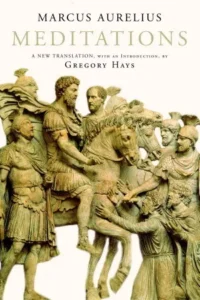
Unlike traditional philosophy books, Meditations wasn’t written for public consumption. It was Marcus’ personal reflections — reminders to himself on how to live well according to Stoic principles. That intimacy is exactly what made it feel so powerful to me. It was like hearing the quiet, often painful voice of a man trying to be good in a chaotic, uncontrollable world.
One passage I underlined heavily — and still return to often — is:
“You have power over your mind — not outside events. Realize this, and you will find strength.” (Book VI, 8)
This simple but profound idea became a guiding light for me during times of uncertainty. I realized how much time I wasted trying to control things outside my power — other people’s opinions, outcomes, even the flow of events. Marcus taught me to turn inward, to focus on mastering my reactions, not reality itself.
Another powerful theme is acceptance of mortality. Marcus constantly reminds himself — and us — that life is fleeting:
“Do not act as if you were going to live ten thousand years. Death hangs over you. While you live, while it is in your power, be good.” (Book IV, 17)
That line shook me the first time I read it. It pushed me to stop procrastinating — on kindness, on honesty, on living fully.
In the context of the Most Recommended Philosophy Books of All Time, Meditations offers a blueprint for resilience: controlling our inner world when the outer world is unpredictable and often harsh. Marcus never promises that life will be easy — only that it is within our power to meet it with dignity.
I keep Meditations by my bedside. It’s not the kind of book you read once; it’s a lifelong companion. In fact, I’d argue that among the Top 20 Philosophy Books, this is the one that has the most power to immediately change the way you live.
4. Meditations on First Philosophy by René Descartes
When I first approached Meditations on First Philosophy by René Descartes, I was honestly intimidated. It has this legendary reputation among the Top 20 Philosophy Books, and within the universe of the Most Read Philosophy Books, Most Searched Philosophy Books, and Most Recommended Philosophy Books of All Time, it holds a central place.
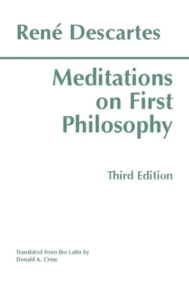
Yet what surprised me most was how vulnerable Descartes’ writing felt — almost like listening to someone rebuilding their entire understanding of reality from scratch.
At its core, Descartes’ project in Meditations on First Philosophy is about radical doubt. He wants to tear down every belief he’s ever held and start anew, building knowledge on a foundation so solid that it cannot be doubted.
The passage that shook me — the one that millions recognize even if they’ve never read the book — is:
“Cogito, ergo sum.”
(“I think, therefore I am.”) (Second Meditation)
In those simple words, Descartes finds the one indubitable truth: if I am doubting, I must exist in some form. That insight hit me like a punch to the chest. I realized how fragile so much of my “certainty” really was — based on assumptions, traditions, perceptions. Descartes teaches us that true knowledge must withstand total skepticism.
Another deeply haunting passage that stayed with me is when Descartes wonders whether a malicious demon might be deceiving him about everything he perceives:
“I will suppose… that some malicious demon of the utmost power and cunning has employed all his energies to deceive me.” (First Meditation)
That idea — that even our senses and experiences might be illusions — was terrifying at first. But in time, it gave me a kind of intellectual freedom: permission to question things deeply, without fear of losing my footing.
Through six meditations, Descartes gradually reconstructs his belief system: establishing the certainty of the self, the existence of God, and the foundations of science and reason. It’s a profound intellectual journey — but also a profoundly human one.
Among all the Top 20 Philosophy Books, Meditations on First Philosophy is the one that taught me most about humility: the courage to say, “I don’t know — but I will think, and doubt, and reason my way toward truth.” And in today’s noisy world of easy answers, that lesson feels more important than ever.
5. Critique of Pure Reason by Immanuel Kant
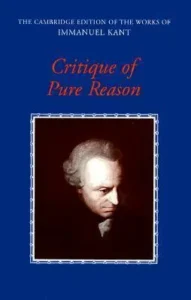
I have to admit — when I first picked up Immanuel Kant’s Critique of Pure Reason, I was overwhelmed. The language, the density, the sheer scale of his ambition — it felt like entering a vast, unfamiliar city with no map.
Yet, step by step, I realized why this work stands so prominently among the Top 20 Philosophy Books, and why it is one of the Most Read Philosophy Books, Most Searched Philosophy Books, and certainly one of the Most Recommended Philosophy Books of All Time.
Kant’s primary question is deceptively simple: How is knowledge possible? But the way he answers it is revolutionary. He proposes that we don’t just passively receive knowledge from the world — instead, our minds actively shape our experiences. As Kant puts it:
“Thoughts without content are empty, intuitions without concepts are blind.” (A51/B76)
That single sentence changed the way I viewed reality itself. It suggested that neither pure reason nor pure experience alone could give me a full picture of the world — that true understanding happens through a delicate dance between the two.
One of the most mind-bending ideas Kant introduces is the distinction between the phenomenal world (what we perceive) and the noumenal world (things as they truly are, independent of our perception). He writes:
“We can know of things only what we put into them ourselves.” (A125)
This notion — that there is a reality forever beyond our direct grasp — was both humbling and oddly comforting for me. It made me realize that human perception, though limited, isn’t a flaw. It’s the necessary filter through which reality becomes meaningful to us.
Another element that deeply resonated with me was Kant’s fierce defense of the limits of pure reason. He shows that some questions — like whether the universe had a beginning or is infinite — are simply beyond the power of human reason to answer definitively.
This humility about the limits of knowledge felt incredibly refreshing in a world obsessed with absolute certainty.
Critique of Pure Reason demands patience, yes. It demands humility. But among the Top 20 Philosophy Books, it gave me perhaps the most liberating lesson of all: understanding the limits of what we can know doesn’t weaken philosophy — it strengthens it. And in my own life, accepting uncertainty has opened doors that blind confidence never could.
Today, whenever I hear someone say “trust your senses” or “trust your logic,” a small part of me smiles — remembering Kant’s powerful reminder that both must work together, and that even then, some mysteries remain beautifully out of reach.
6. Beyond Good and Evil by Friedrich Nietzsche
Encountering Friedrich Nietzsche’s Beyond Good and Evil for the first time felt like being struck by lightning. It’s impossible to walk away from this book without feeling shaken, challenged, and — oddly — invigorated. It’s no wonder it firmly holds a place among the Top 20 Philosophy Books, as well as being one of the Most Read Philosophy Books, Most Searched Philosophy Books, and Most Recommended Philosophy Books of All Time.
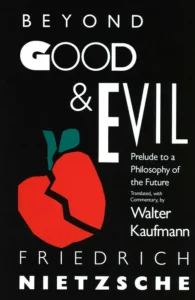
In Beyond Good and Evil, Nietzsche turns his fierce, unrelenting gaze on the moral values we often take for granted. One of the first lines that completely gripped me was:
“He who fights with monsters should look to it that he himself does not become a monster. And if you gaze long into an abyss, the abyss also gazes into you.” (Aphorism 146)
Reading that, I felt as though Nietzsche had exposed something dark but essential about the human condition: the dangers of self-righteousness, the fact that even our best intentions can curdle into something monstrous if we aren’t vigilant.
One major theme that resonated with me is Nietzsche’s attack on “slave morality” — the idea that traditional Christian values of humility, meekness, and self-denial stem not from strength, but from the resentment of the weak. He provocatively claims:
“Morality is the herd-instinct in the individual.” (Aphorism 116)
That line made me pause and think: how many of my own beliefs about right and wrong were truly mine, and how many were simply inherited without question? Nietzsche challenges us to go beyond simplistic dichotomies of “good” and “evil” — to forge our own values with strength, creativity, and self-overcoming.
Another passage that stayed with me deeply is Nietzsche’s description of the “free spirit”:
“The noble soul has reverence for itself.” (Aphorism 287)
For someone like me, who grew up being taught that modesty and humility were the highest virtues, this radical affirmation of self-respect and self-love felt both shocking and strangely liberating. Nietzsche doesn’t advocate selfishness — he advocates authenticity, power, and the courage to live without illusions.
Among all the Top 20 Philosophy Books, Beyond Good and Evil might be the one that made me the most uncomfortable — but also the one that made me the most alive. Nietzsche doesn’t want followers; he wants provocateurs, questioners, creators. After reading him, I couldn’t look at morality, society, or even my own motivations the same way again.
And that, I realized, is exactly why Nietzsche is still among the Most Read Philosophy Books and Most Recommended Philosophy Books of All Time: he doesn’t offer comfort. He offers truth — raw, difficult, and electrifying.
7. Thus Spoke Zarathustra by Friedrich Nietzsche

Reading Thus Spoke Zarathustra was, for me, like stepping into a dream where philosophy and poetry intertwine. It’s not just a book you read — it’s an experience you feel. No list of the Top 20 Philosophy Books would be complete without it. It’s also easily one of the Most Read Philosophy Books, Most Searched Philosophy Books, and certainly one of the Most Recommended Philosophy Books of All Time.
At its heart, this book tells the story of Zarathustra, a prophet-like figure who descends from his mountain solitude to deliver his wisdom to humanity. The themes are vast and sweeping: the death of God, the rise of the Übermensch (Overman or Superman), the eternal recurrence, and the profound loneliness of the true individual.
The line that struck me the hardest — and continues to haunt me — is when Zarathustra declares:
“God is dead. God remains dead. And we have killed him.” (Part Two, “Of the Priests”)
It wasn’t a literal attack on God but a philosophical statement about the collapse of traditional values. Reading that, I felt the full weight of modern existential anxiety — the realization that if old certainties are gone, we must create meaning for ourselves.
Another passage that stayed with me, and honestly gave me chills, was Zarathustra’s teaching on the Übermensch:
“Man is something that shall be overcome. What have you done to overcome him?” (Prologue, 4)
Nietzsche isn’t advocating a biological evolution but a spiritual one: a call for humanity to transcend its weaknesses, its herd mentality, and its reliance on external authority. After reading this, I spent weeks reflecting: what parts of myself needed to be “overcome” if I was to live more authentically?
There’s also a profound tenderness in Zarathustra’s character — his frequent loneliness, his sorrow that his message will be misunderstood. Nietzsche captures this beautifully:
“I love him whose soul is lavish, who wants no thanks and does not give back: for he always bestows and desires not to keep for himself.” (Prologue, 4)
Among all the Top 20 Philosophy Books, Thus Spoke Zarathustra feels the most alive, the most urgent. It’s not dry theory — it’s a call to arms for the soul. It demands that you rethink who you are, who you can become, and whether you have the courage to live without ready-made answers.
In the world of the Most Read Philosophy Books and the Most Recommended Philosophy Books of All Time, Zarathustra remains a lonely mountain peak — dazzling, intimidating, and endlessly inspiring for those brave enough to make the climb.
8. Being and Time by Martin Heidegger
Reading Being and Time by Martin Heidegger was, without a doubt, one of the most intellectually humbling experiences of my life.
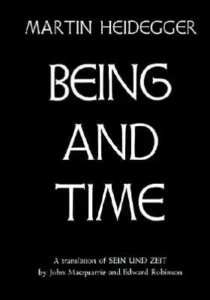
I had heard of its reputation before — it’s firmly enshrined among the Top 20 Philosophy Books, and counts itself among the Most Read Philosophy Books, Most Searched Philosophy Books, and Most Recommended Philosophy Books of All Time — but nothing prepared me for the sheer existential weight of this work.
Heidegger doesn’t ask the usual philosophical questions. Instead, he asks something far more elemental: What does it mean to be?
That might sound abstract, but the way Heidegger leads us into it is anything but academic — it’s visceral. He introduces the concept of Dasein — literally “being-there” — to describe human existence, not as a detached observer, but as a being thrown into the world, into time, into finitude.
One of the passages that hit me hardest is Heidegger’s meditation on death:
“Death is the possibility of the absolute impossibility of Dasein.” (Division Two, Section 50)
In that one sentence, I felt the weight of my own mortality like never before. Heidegger doesn’t talk about death as some event in the future — he talks about it as an essential structure of our very being. Living authentically means living with the constant, sobering awareness of death — not in fear, but in heightened aliveness.
Another concept that changed how I view everyday life is Heidegger’s idea of “fallenness” — the tendency of Dasein to lose itself in the trivialities of the world: gossip, distraction, busywork. He writes:
“Dasein is always already fallen away from itself into the world.” (Division One, Section 38)
That made me painfully aware of how often I slip into habits that numb me to existence — scrolling endlessly, chasing small anxieties, avoiding the deeper questions.
Perhaps the most liberating lesson Heidegger offers is the idea of authenticity — the ability to seize one’s own existence, to recognize that life is not given meaning by external structures but by our own courageous engagement with Being itself.
Among the Top 20 Philosophy Books, Being and Time is probably the one that demands the most from its reader — and the one that gives the most back in return. It’s a brutal, beautiful confrontation with life itself. And no matter how often I revisit it, it never lets me walk away unchanged.
It’s no accident that this book remains among the Most Read Philosophy Books, Most Searched Philosophy Books, and Most Recommended Philosophy Books of All Time: because Heidegger doesn’t just give you new thoughts — he gives you a new way of existing.
9. Language, Truth, and Logic by A.J. Ayer
When I first picked up Language, Truth, and Logic by A.J. Ayer, I didn’t realize I was stepping into one of the most influential philosophical battlegrounds of the 20th century. Published in 1936, Ayer’s work isn’t just a philosophical text; it’s a sharp, daring manifesto that redefined how many of us think about knowledge, language, and meaning. It’s no surprise to me that it remains one of the Top 20 Most Read, Searched, and Recommended Philosophy Books of All Time.
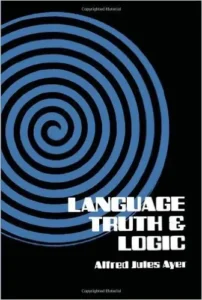
At its core, Language, Truth, and Logic champions a theory known as logical positivism. Ayer argues that for a statement to be truly meaningful, it must either be empirically verifiable (provable through experience) or analytically true (true by definition, like “all bachelors are unmarried”). Everything else — metaphysics, religious claims, moral judgments — he boldly dismisses as meaningless. Not wrong, necessarily, but lacking any factual content worth debating.
Reading it for the first time, I found Ayer’s writing both refreshing and brutal. He doesn’t hedge or soften his blows. I especially remember being struck by his treatment of ethics. Instead of arguing whether something is “right” or “wrong,” Ayer claims that moral statements simply express emotional reactions — like saying “Boo!” or “Hooray!” — rather than facts about the world. That idea shook me, not because I agreed completely, but because it forced me to confront assumptions I hadn’t even realized I was carrying.
The themes of empirical verification, meaningfulness, and the dismissal of metaphysics made Language, Truth, and Logic a foundational text for anyone interested in philosophy of language or scientific philosophy. It challenged the grand, sweeping claims of older philosophers and forced philosophy to become more rigorous, almost scientific.
Why does it deserve its place among the top 20? In my view, it’s because Ayer achieved something very rare: he made philosophy feel urgent, disruptive, and necessary. Even if you disagree with him — and many great thinkers have — you cannot ignore him. Every time I recommend the book to a friend, I warn them: this isn’t a book you’ll read and forget. It’s a book that will change how you think about thinking.
Language, Truth, and Logic doesn’t just belong on a list of important books; it defines why such lists exist at all.
10. Philosophical Investigations by Ludwig Wittgenstein
Reading Ludwig Wittgenstein’s Philosophical Investigations felt like reuniting with an old friend — only to discover he had transformed entirely. After the stark, crystalline logic of the Tractatus, this book felt more like wandering through a living, breathing city of thoughts.
It’s absolutely no surprise that it ranks high among the Top 20 Philosophy Books, and remains one of the Most Read Philosophy Books, Most Searched Philosophy Books, and Most Recommended Philosophy Books of All Time.
In the Investigations, Wittgenstein abandons the rigid formalism of his earlier work. Instead, he embraces the messiness of everyday language. One line that immediately shifted my understanding of philosophy was:
“Philosophy is a battle against the bewitchment of our intelligence by means of language.” (p.109)
That single sentence made me realize how often our confusion isn’t about the world itself — but about how we talk about it. I saw in my own life how arguments, misunderstandings, and even personal doubts often came down to getting trapped in language games.
One of Wittgenstein’s central insights in Philosophical Investigations is that meaning is use: words don’t have fixed, secret meanings; their meaning comes from how they’re used in life. As he famously puts it:
“For a large class of cases—though not for all—in which we employ the word ‘meaning,’ it can be defined thus: the meaning of a word is its use in the language.”
This was revolutionary for me. It taught me to stop obsessing over abstract definitions and to look at how language actually works in practice — messy, fluid, human.
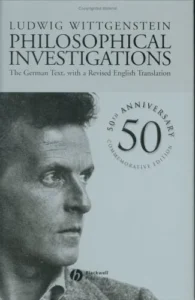
Another idea that profoundly moved me was his exploration of private language. Wittgenstein argues that truly private language — language referring to sensations that only the speaker could know — is impossible. In doing so, he shows how deeply interconnected we are through shared forms of life. Even our most private feelings are shaped by the public tools of language.
The tone of Philosophical Investigations is also different — it’s questioning, exploratory, playful even. Wittgenstein doesn’t deliver a grand theory. He invites us to look closely at ordinary life and find philosophy there.
Among the Top 20 Philosophy Books, Philosophical Investigations stands out because it teaches humility: the world is not made of absolute certainties waiting to be captured by grand theories. It’s made of practices, of human forms of life, endlessly shifting and evolving.
Today, when I catch myself getting tangled in abstract debates, I hear Wittgenstein’s voice gently suggesting: Look at how the words are being used.
And once again, I find clarity.
That’s why this masterpiece is still firmly among the Most Read Philosophy Books, Most Searched Philosophy Books, and Most Recommended Philosophy Books of All Time — and why it remains one of the most powerful philosophical experiences I’ve ever had.
11. The Prince by Niccolò Machiavelli
When I first opened Niccolò Machiavelli’s The Prince, I expected a cold manual for tyrants. What I found instead was a brutally honest meditation on power — far more complex, even tragic, than its reputation suggests.

It’s no surprise it remains one of the Top 20 Philosophy Books, and stands tall among the Most Read Philosophy Books, Most Searched Philosophy Books, and Most Recommended Philosophy Books of All Time.
Machiavelli doesn’t shy away from hard truths. He insists that rulers must sometimes act immorally if they are to maintain power and protect their states. One line that chilled me — and stayed etched in my mind — was:
“A prince never lacks legitimate reasons to break his promise.” (Chapter XVIII)
That sentence made me feel both fascinated and disturbed. Machiavelli wasn’t teaching evil; he was describing reality as he saw it, unfiltered by idealism. He wanted rulers to succeed — and success, in his view, required adaptability, cunning, and sometimes deception.
Another unforgettable passage is his observation:
“It is better to be feared than loved, if you cannot be both.” (Chapter XVII)
At first, I recoiled from this advice. But then I thought about leaders, both historical and modern, and realized how often those who tried to rely solely on love or goodwill ended up betrayed or defeated. Machiavelli wasn’t glorifying cruelty — he was pointing out that love is fickle, while fear (when properly managed) is more reliable.
One of the most surprising themes for me was Machiavelli’s admiration for virtù — not virtue in the moral sense, but a kind of boldness, energy, and decisiveness. He admired leaders who shaped fortune to their will, rather than passively accepting fate. He writes:
“Fortune favors the bold.” (Chapter XXV)
Reading The Prince, I realized it wasn’t just a handbook for rulers — it was a mirror held up to human nature itself. We all, in our own lives, face Machiavellian dilemmas: when to compromise, when to stand firm, when to adapt to brutal realities.
Among all the Top 20 Philosophy Books, The Prince stands out because it dares to say what others fear to: that ethics and politics don’t always align neatly. It remains one of the Most Read Philosophy Books and one of the Most Recommended Philosophy Books of All Time because it forces us to confront power honestly — and to think carefully about how far we’re willing to go to achieve our goals.
After reading it, I couldn’t see politics — or even everyday human relationships — the same way again.
12. A Treatise of Human Nature by David Hume
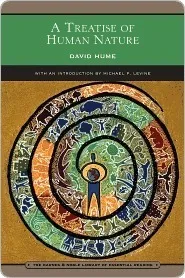
When I first attempted David Hume’s A Treatise of Human Nature, I found myself both frustrated and fascinated. The writing isn’t always easy — Hume himself later joked that the book “fell dead-born from the press” — but once I settled into it, it opened my mind in ways few books ever have.
No wonder it has earned its place among the Top 20 Philosophy Books, and remains one of the Most Read Philosophy Books, Most Searched Philosophy Books, and Most Recommended Philosophy Books of All Time.
Hume’s starting point is stunningly bold: he wants to apply the methods of scientific inquiry to human nature itself. Rather than speculate grandly, he insists that philosophy must begin with experience. One of his most famous, and unsettling, conclusions is:
“Reason is, and ought only to be the slave of the passions.” (Book II, Part III, Section III)
Reading that for the first time felt almost scandalous. We often like to believe we are rational beings first and foremost — but Hume shows that our emotions, our desires, ultimately drive our reason. Logic is the servant, not the master. I found myself thinking about how often my decisions, even ones I proudly called “rational,” were actually shaped by deeper feelings.
Another core insight that shook me was Hume’s devastating skepticism about causality. We assume that cause and effect are logically necessary — but Hume argues that they are simply habits of thought based on repeated observation. He writes:
“All reasonings concerning matter of fact seem to be founded on the relation of cause and effect… But, after all, the inference from one to another is not determined by reason, but by custom.” (Book I, Part III, Section VI)
This shattered my naïve faith in the certainty of science and knowledge. According to Hume, we don’t truly “know” that the sun will rise tomorrow — we simply expect it based on past experience.
Yet A Treatise of Human Nature isn’t nihilistic. If anything, Hume’s gentle skepticism feels profoundly human. He acknowledges our limitations but doesn’t despair over them. Instead, he invites us to build our understanding humbly, patiently, one experience at a time.
Among all the Top 20 Philosophy Books, A Treatise of Human Nature stands as a profound challenge to our assumptions about knowledge, identity, and reality. It’s no surprise that it remains among the Most Read Philosophy Books, Most Searched Philosophy Books, and Most Recommended Philosophy Books of All Time.
After finishing Hume, I walked away not with despair, but with wonder — a deeper appreciation for the fragile, magnificent project of human understanding.
13. The Myth of Sisyphus by Albert Camus
Reading The Myth of Sisyphus was one of the most transformative experiences of my life. Few books have ever made me feel so personally addressed, so implicated in the very problem of existence itself.
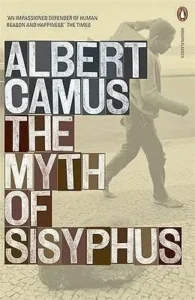
It’s no surprise that Camus’ masterpiece holds a rightful spot among the Top 20 Philosophy Books, and it remains one of the Most Read Philosophy Books, Most Searched Philosophy Books, and Most Recommended Philosophy Books of All Time.
Camus begins with a shockingly direct claim: “There is but one truly serious philosophical problem, and that is suicide.” (Opening line)
That sentence hit me like a thunderclap. It wasn’t morbid fascination; Camus was asking: if life is ultimately absurd — lacking inherent meaning — is it still worth living?
As I read, I found that Camus does not shy away from the horror of the absurd — the confrontation between our longing for meaning and the indifferent silence of the universe. Yet instead of despair, he offers something astonishing: defiance, joy, even beauty.
The core image of the book is, of course, Sisyphus — condemned by the gods to roll a boulder up a hill for eternity, only to have it roll back down again. Camus writes:
“The struggle itself toward the heights is enough to fill a man’s heart. One must imagine Sisyphus happy.” (Conclusion)
That final image stunned me. Sisyphus is not a figure of defeat; he is a figure of victory. Despite the meaninglessness of his task, he owns it, he embraces it, and through his struggle, he transcends it.
Another passage that particularly moved me was Camus’ insistence that the absurd must be faced without appeal to illusions:
“Living an experience, a particular fate, is accepting it fully.” (Part I)
Camus doesn’t advocate resignation or nihilism. He calls for an active, rebellious acceptance — to live fully, love deeply, and create richly in the teeth of absurdity.
Among all the Top 20 Philosophy Books, The Myth of Sisyphus might be the one that speaks most urgently to our times, and perhaps to every human heart across history. It’s little wonder that it remains among the Most Read Philosophy Books, Most Searched Philosophy Books, and Most Recommended Philosophy Books of All Time.
When I closed the book for the first time, I remember feeling strangely liberated. Life might be absurd — but that only makes each moment more precious, more vivid, and more deeply ours to claim.
14. Being and Nothingness by Jean-Paul Sartre
Reading Jean-Paul Sartre’s Being and Nothingness felt, at first, like trying to navigate a labyrinth without a map. Yet as I persisted, it slowly unfolded into one of the most profound explorations of human freedom I have ever encountered.
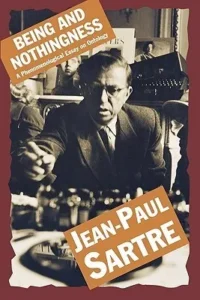
It absolutely belongs among the Top 20 Philosophy Books, and it continues to be one of the Most Read Philosophy Books, Most Searched Philosophy Books, and Most Recommended Philosophy Books of All Time.
At the heart of Sartre’s philosophy is the radical idea that existence precedes essence. That is, we are not born with a pre-defined nature or purpose — we must invent ourselves through our choices. As Sartre writes:
“Man is nothing else but what he makes of himself.” (Introduction)
When I first read those words, they stunned me. It was liberating and terrifying at once. Sartre was telling me that there are no excuses — not fate, not God, not society — for who I become. My life is my own creation.
Another concept that challenged me deeply was Sartre’s analysis of bad faith (mauvaise foi), the ways in which we lie to ourselves to escape the burden of our freedom. For example, a waiter who rigidly plays the role of “waiter” is, in Sartre’s view, denying his own transcendent freedom. Sartre explains:
“It is thus that many live in bad faith… fleeing what they cannot flee, fleeing what they are.” (Part One, Chapter Two)
Reading that made me painfully aware of the times I had hidden behind roles — the “good student,” the “reliable friend” — instead of embracing the messy, open-ended reality of who I am.
Another unforgettable insight is Sartre’s meditation on the gaze of the Other. When we are seen by someone else, we become an object in their world, and this fundamentally alters our experience of ourselves. He writes:
“The Other is the one who looks at me and thereby reduces me to an object.” (Part Three, Chapter One)
That idea — that our self-identity is shaped and sometimes distorted by how others perceive us — resonated with me deeply. It helped explain so much about insecurity, pride, shame, and self-consciousness in everyday life.
Among the Top 20 Philosophy Books, Being and Nothingness stands out because of its emotional intensity. Sartre doesn’t merely think about freedom — he makes you feel the dizzying, almost unbearable burden of it.
No wonder it remains among the Most Read Philosophy Books, Most Searched Philosophy Books, and Most Recommended Philosophy Books of All Time. Sartre doesn’t offer easy answers — he offers the truth that to be human is to be free, responsible, and, ultimately, alone.
After finishing this massive, exhausting book, I wasn’t the same. I felt heavier, yes — but also infinitely more alive.
15. Confessions by Augustine of Hippo
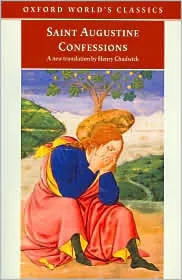
Reading Augustine’s Confessions felt like being invited into the most intimate corners of a man’s soul. It’s one thing to study philosophy abstractly; it’s another to watch someone wrestle with truth, guilt, longing, and redemption in real time.
It’s clear why this masterpiece is permanently ranked among the Top 20 Philosophy Books, and remains one of the Most Read Philosophy Books, and Most Recommended Philosophy Books of All Time.
From the very first line, Augustine’s tone is one of raw honesty:
“You have made us for yourself, O Lord, and our hearts are restless until they rest in you.” (Book I, Chapter 1)
That line pierced me the first time I read it. I recognized in myself the same restless longing — the search for something beyond achievement, pleasure, or pride. Augustine’s confession is not just about personal sins; it’s about the universal human hunger for meaning and belonging.
One passage that haunted me for days was Augustine’s recollection of stealing pears as a boy — not out of need, but simply for the thrill of doing wrong:
“I loved my own undoing. I loved my error — not that for which I erred, but the error itself.” (Book II, Chapter 4)
That brutally honest admission made me look more carefully at my own motives. How often do we do things not because they are good for us — but because we are seduced by rebellion itself?
Another unforgettable moment comes when Augustine reflects on the nature of time — a meditation that feels as modern as any existentialist writing:
“What, then, is time? If no one asks me, I know what it is. If I wish to explain it to him who asks, I do not know.” (Book XI, Chapter 14)
That line perfectly captures the paradoxes we live with: the things most familiar to us — time, love, self — often slip through our fingers when we try to grasp them with words.
Confessions is not merely an autobiography. It’s a philosophical and theological exploration of memory, desire, sin, grace, and the mystery of existence itself.
Among the Top 20 Philosophy Books, Augustine’s Confessions feels the most human — trembling, proud, broken, yearning.
After reading it, I felt less alone in my struggles — and more connected to the long, painful, beautiful search for truth that defines us all.
16. Analects by Confucius
Reading Confucius’ Analects for the first time was like listening to the steady, wise voice of a grandfather — someone who has seen the world, understands its sorrows and its hopes, and offers simple, profound advice without ever preaching.
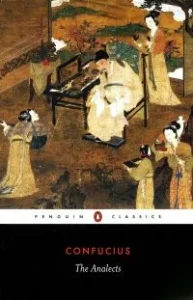
It’s easy to see why this book remains among the Top 20 Philosophy Books, and continues to rank highly as one of the Most Read Philosophy Books, and Most Recommended Philosophy Books of All Time.
What makes the Analects so unique is its structure: not a treatise or a systematic philosophy, but a series of conversations, sayings, and reflections compiled by Confucius’ disciples. Yet within its pages, I found a vision of life that felt at once grounded and aspirational.
One of the lines that has stayed with me — and that I often find myself recalling — is:
“The Master said, ‘Is it not a pleasure, having learned something, to try it out at due intervals? Is it not a joy to have friends come from afar? Is it not gentlemanly not to take offense when others fail to appreciate your abilities?’” (Book I, 1)
That line taught me the quiet beauty of patience, learning, humility, and community. In a world that often demands instant recognition and rewards, Confucius reminds us to find joy in the journey itself.
Another profound teaching is Confucius’ emphasis on ren — often translated as “benevolence” or “humaneness.” He says:
“The Master said, ‘To be able to practice five things everywhere under heaven constitutes perfect virtue… gravity, generosity of soul, sincerity, earnestness, and kindness.’” (Book XVII, 6)
Reading that, I realized how rare — and how revolutionary — true kindness and sincerity are, not only in others but in myself. It made me want to become better, not for status or approval, but because decency itself is a kind of sacred duty.
There’s also a quiet radicalism in Confucius’ insistence that nobility comes from virtue, not birth. In one famous passage, he declares:
“By nature, men are nearly alike; by practice, they get to be wide apart.” (Book XVII, 2)
That simple line reminds me that we are not imprisoned by our circumstances; our choices, our daily actions, are what define who we are.
Among the Top 20 Philosophy Books, the Analects shines for its quiet, steady moral wisdom. It remains among the Most Read Philosophy Books, because it teaches — without shouting — that becoming a good human being is the greatest task of all.
Every time I return to the Analects, I find new inspiration to live more thoughtfully, more patiently, and more generously — and in that sense, Confucius feels as close today as he must have to his students 2,500 years ago.
17. Tao Te Ching by Lao Tzu
Reading Lao Tzu’s Tao Te Ching felt less like studying a philosophy book and more like sitting quietly by a river, watching the water flow effortlessly by. It’s one of the most poetic works among the Top 20 Philosophy Books, and continues to be treasured as one of the Most Read Philosophy Books, Most Searched Philosophy Books, and Most Recommended Philosophy Books of All Time.
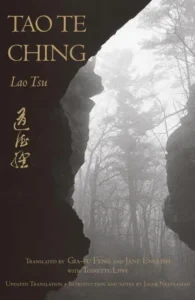
The Tao Te Ching is about the Tao — the Way — which cannot be fully described or contained. In one of its most famous lines, Lao Tzu writes:
“The Tao that can be told is not the eternal Tao. The name that can be named is not the eternal name.” (Chapter 1)
The first time I read that line, I felt a strange mixture of frustration and peace. Lao Tzu was warning me from the beginning: true wisdom can’t be trapped in words or concepts. It must be lived, felt, intuited.
One of the central themes that profoundly shaped my thinking was the idea of wu wei — “non-action” or “effortless action.” As Lao Tzu explains:
“Practice not-doing, and everything will fall into place.” (Chapter 3)
At first, this seemed almost absurd to someone raised on the virtues of ambition and control. But as I reflected deeper, I realized Lao Tzu wasn’t advocating laziness. He was pointing to a kind of wise harmony with the flow of life — not forcing, not striving against nature, but acting in tune with the deeper currents of existence.
Another passage that moved me deeply comes when Lao Tzu praises humility:
“All streams flow to the sea because it is lower than they are. Humility gives it its power.” (Chapter 66)
That image — of power through humility, of leadership through yielding — stayed with me long after the book was closed. In a world obsessed with dominance and noise, Lao Tzu quietly reminds us that the soft, the patient, and the humble often outlast the strong and boastful.
Among the Top 20 Philosophy Books, the Tao Te Ching stands apart for its lyrical, almost mystical wisdom. It continues to be among the Most Read Philosophy Books, Most Searched Philosophy Books, and Most Recommended Philosophy Books of All Time because it offers not a rigid system, but a living practice: a way of moving through life with grace, balance, and wonder.
Whenever life feels chaotic and heavy, I find myself returning to Lao Tzu’s quiet words — and somehow, the river keeps flowing, carrying me gently forward.
18. Ethics by Baruch Spinoza
Reading Spinoza’s Ethics was a completely different experience from any other philosophy book I had ever encountered. It didn’t feel like reading a human argument — it felt like encountering a divine geometric proof of existence itself.
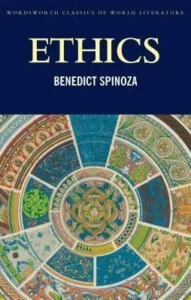
It’s easy to see why this masterpiece belongs among the Top 20 Philosophy Books, and why it remains one of the and Most Recommended Philosophy Books of All Time.
Spinoza organizes Ethics like a mathematical system: definitions, axioms, propositions, proofs. At first, I found this almost cold. But as I pressed on, a strange warmth began to emerge — the warmth of a mind that sought to see everything, even the deepest human emotions, as part of a single, unified reality.
The line that fundamentally shifted my worldview comes early:
“God, or Nature, is one and the same.” (Part I, Proposition XIV)
With that breathtaking claim, Spinoza tears down the barrier between the sacred and the natural. God is not a distant, judging being; God is the infinite, necessary substance of reality itself. Reading this felt like a revelation: the universe itself is divine, and we are inseparable from it.
Another deeply moving idea is Spinoza’s concept of human bondage — how often we believe ourselves to be free, yet are actually enslaved by our passions and incomplete understanding. He writes:
“The free man thinks least of all of death, and his wisdom is a meditation on life, not on death.” (Part IV, Proposition LXVII)
That passage challenged me profoundly. How much of my life had been driven by fear, by avoidance of pain, by a clinging to illusions? Spinoza urges us instead toward clarity, reason, and love — to see things under the aspect of eternity (sub specie aeternitatis).
His vision of human happiness — not as wild passion, but as joyful understanding of necessity — offered me a new model of peace. Freedom, for Spinoza, is not the ability to do whatever we want, but the ability to understand why we want, and to align ourselves consciously with the rational order of nature.
Among the Top 20 Philosophy Books, Ethics is perhaps the most quietly revolutionary. It doesn’t scream or rage or despair. It simply unfolds, with a crystalline beauty, a vision of a world where everything fits, everything belongs, everything is necessary.
It’s no wonder Ethics remains one of the Most Read Philosophy Books, Most Searched Philosophy Books, and Most Recommended Philosophy Books of All Time — and why it continues to offer not just knowledge, but serenity to those willing to enter its demanding, luminous world.
19. A Theory of Justice by John Rawls
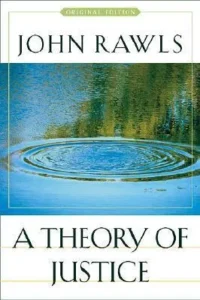
When I first opened John Rawls’ A Theory of Justice, I honestly expected something dry — a legalistic treatise on fairness. What I discovered instead was a vision of a more compassionate, more rational world. It’s easy to understand why this book stands firmly among the Top 20 Philosophy Books, and remains one of the Most Read Philosophy Books, Most Searched Philosophy Books, and Most Recommended Philosophy Books of All Time.
At the heart of Rawls’ work is a simple but profoundly powerful question: What would a just society look like if none of us knew in advance where we would end up in it? He introduces the concept of the original position and the veil of ignorance:
“No one knows his place in society, his class position or social status; nor does he know his fortune in the distribution of natural assets and abilities, his intelligence and strength, and the like.” (Chapter III)
Reading this, I had to pause. Imagine designing the rules of society without knowing whether you would be rich or poor, powerful or powerless, healthy or sick. Wouldn’t you want a society that protected the least advantaged — just in case you ended up there yourself?
This radical fairness, this deep empathy baked into rational choice, was unlike anything I had ever encountered before in political theory.
Rawls then articulates two key principles of justice. The first ensures basic rights and liberties for all. The second — which moved me most deeply — is the difference principle:
“Social and economic inequalities are to be arranged so that they are to the greatest benefit of the least advantaged.” (Chapter II)
That sentence made me rethink everything I thought I knew about success, wealth, and society. Rawls doesn’t argue against inequality itself — but he insists that it can only be justified if it uplifts those who are worst off.
Another idea that stayed with me is Rawls’ emphasis that justice is the first virtue of institutions, just as truth is the first virtue of systems of thought. He writes:
“Justice is the first virtue of social institutions, as truth is of systems of thought.” (Chapter I)
Among all the Top 20 Philosophy Books, A Theory of Justice stands out for its moral clarity and practical applicability. It offers not just an abstract idea of fairness, but a real-world blueprint for building societies that reflect our best ideals.
It’s no wonder that it remains one of the Most Read Philosophy Books, Most Searched Philosophy Books, and Most Recommended Philosophy Books of All Time.
After reading Rawls, I found it harder to tolerate injustice — and easier to imagine a world worth working toward.
20. Man’s Search for Meaning by Viktor Frankl
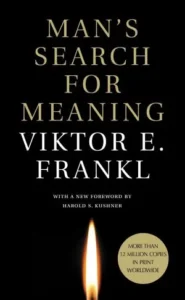
Reading Viktor Frankl’s Man’s Search for Meaning changed something deep inside me. Unlike any other work among the Top 20 Philosophy Books, this one feels less like pure philosophy and more like a testimony — a call to the human soul. It’s no surprise that it remains one of the Most Read Philosophy Books, Most Searched Philosophy Books, and Most Recommended Philosophy Books of All Time.
Frankl, a psychiatrist and Holocaust survivor, reflects on his time in Nazi concentration camps, and what he learned about human nature through the worst horrors imaginable. Very early in the book, he offers a line that immediately lodged itself into my heart:
“Everything can be taken from a man but one thing: the last of the human freedoms — to choose one’s attitude in any given set of circumstances, to choose one’s own way.” (Part One)
When I read that for the first time, I had to stop and breathe. Frankl was not speaking from a place of comfort, but from the depths of suffering — and still, he insisted on the primacy of choice, of inner freedom.
One of the most moving concepts Frankl introduces is logotherapy — the idea that the search for meaning, not the pursuit of pleasure or power, is the primary motivational force in humans. He writes:
“Those who have a ‘why’ to live, can bear with almost any ‘how’.” (Part One, quoting Nietzsche)
That insight reframed my own struggles. It wasn’t suffering itself that broke people — it was the loss of meaning. If we can find purpose, even in pain, we can endure almost anything.
Frankl also beautifully addresses the idea that meaning is unique for each person and each moment:
“Life ultimately means taking the responsibility to find the right answer to its problems and to fulfill the tasks which it constantly sets for each individual.” (Part Two)
Reading this, I realized meaning is not handed to us. It’s something we must actively seek, even — and especially — when life feels cruel or chaotic.
Among the Top 20 Philosophy Books, Man’s Search for Meaning stands out because it bridges philosophy, psychology, and raw human testimony.
It remains among the Most Read Philosophy Books, Most Searched Philosophy Books, and Most Recommended Philosophy Books of All Time because it speaks to something universal: the enduring human need for purpose, even in the darkest times.
When I closed the book, I didn’t feel despair — I felt quietly stronger. Frankl doesn’t promise that life will be easy or fair. But he insists that meaning is always possible — and that, perhaps, is the most important truth we can ever hold onto.
Conclusion: Why These Philosophy Books Remain Timeless
The books listed in this post—from Plato’s Republic to Nietzsche’s Thus Spoke Zarathustra and Frankl’s Man’s Search for Meaning—have endured for centuries because they tackle the biggest questions of human existence: What is truth? How should we live? What gives life meaning?
Key Takeaways for Readers:
- Foundational Wisdom – Works like Aristotle’s Nicomachean Ethics and Kant’s Critique of Pure Reason shaped entire schools of thought and remain essential for understanding ethics, politics, and knowledge.
- Practical Relevance – Modern classics (e.g., Marcus Aurelius’ Meditations) offer actionable insights for resilience, leadership, and personal growth.
- Cultural Impact – Eastern texts like Tao Te Ching and Western manifestos like Marx’s Das Kapital continue to influence philosophy, psychology, business, and spirituality worldwide.
Why Keep Reading Philosophy?
- Sharpen Critical Thinking – These books challenge assumptions and refine logic.
- Find Deeper Meaning – From existentialism (Camus, Sartre) to stoicism (Aurelius, Epictetus), they provide frameworks for navigating life’s struggles.
- Stay Engaged with History’s Greatest Minds – Philosophy isn’t just academic; it’s a conversation across time about what matters most.
Final Recommendation: Whether you’re a student, seeker, or lifelong learner, start with one book from this list—perhaps Meditations for practical wisdom or The Republic for foundational Western thought—and let it guide your own philosophical journey.
